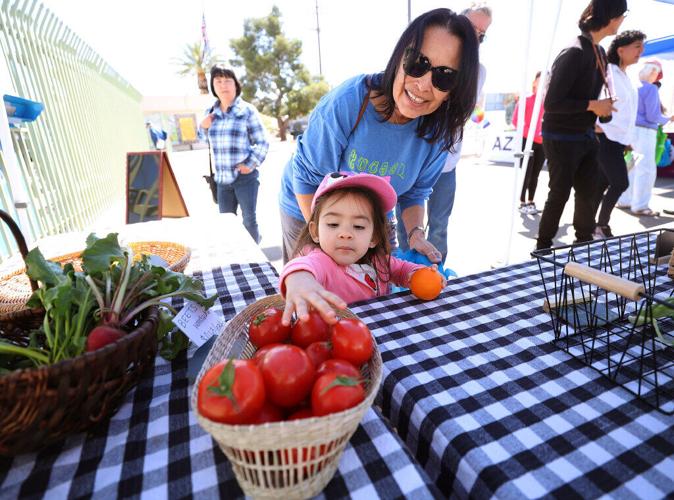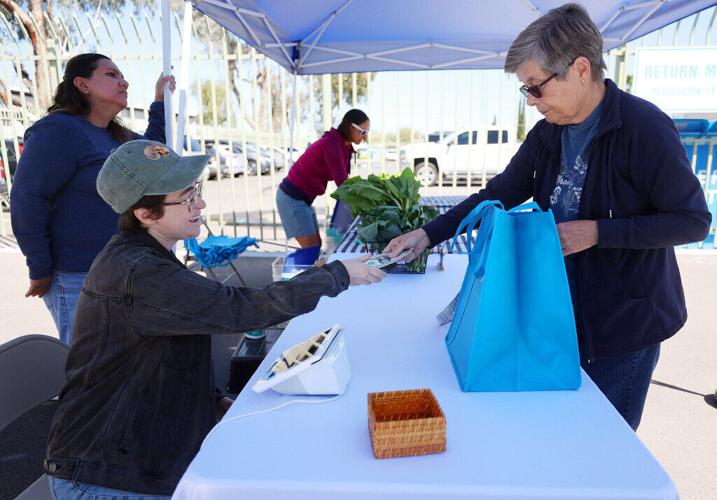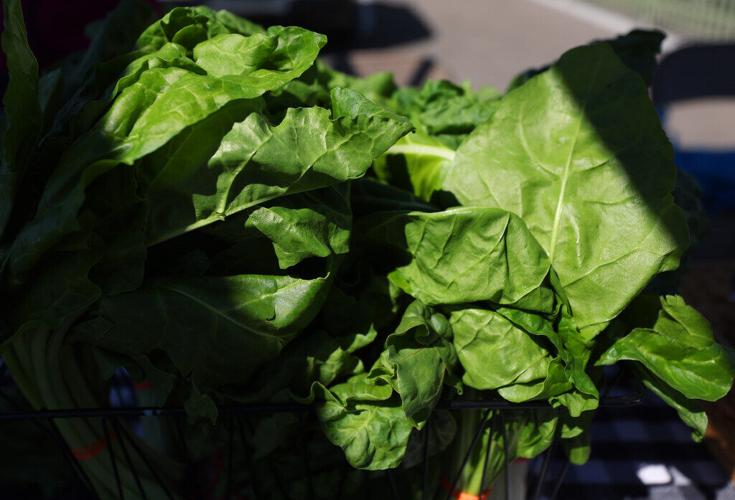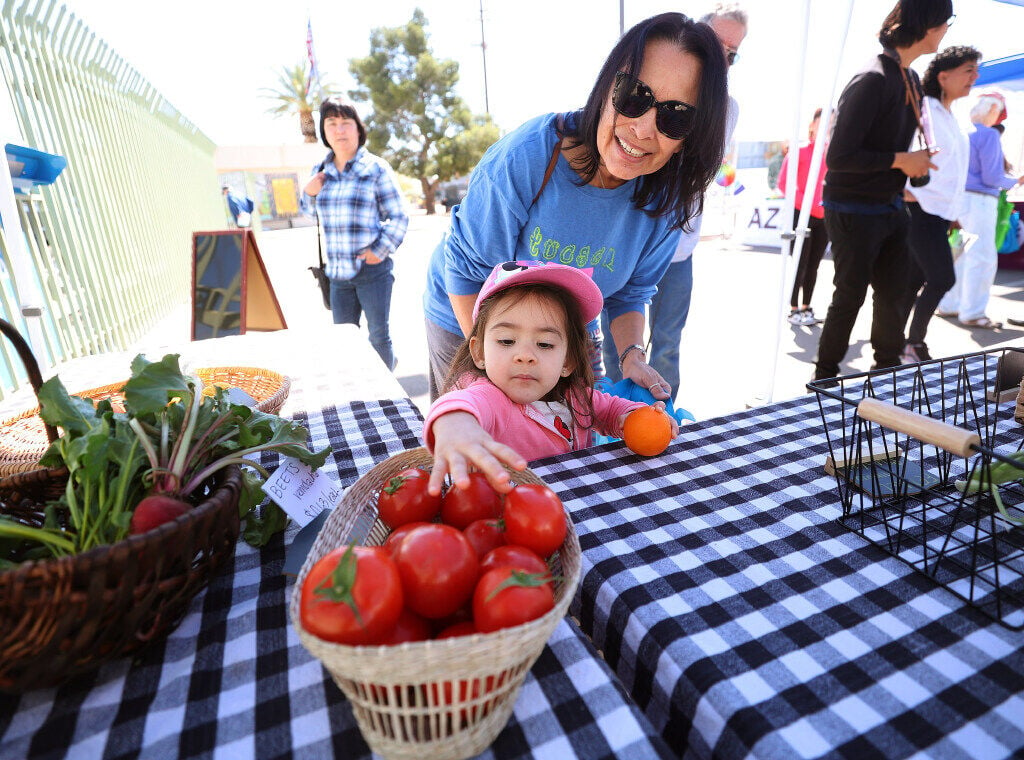By 11 a.m., all that was left on The Garden Kitchen’s table was a basket of collards, fennel and chard.
When the PLAZA Mobile Market opened an hour earlier, they had a table full of produce like tomatoes, lettuce, oranges, lemons and green onions, along with loaves of famous Barrio Bread. But in the matter of 60 minutes, the majority of the fresh vegetables were gone.
Set up every Wednesday in front of the Valencia Library, 202 W. Valencia Road, Meredith Glaubach and the rest of The Garden Kitchen staff run a mobile farmers market, tackling food insecurity one head of lettuce at a time. The market is dubbed PLAZA, which stands for “promoting local AZ agriculture.”
Back in June, Glaubach joined The Garden Kitchen, a program that is part of the University of Arizona Cooperative Extension which provides practical information and education to help improve people’s lives in urban and rural areas of Pima County. The Garden Kitchen specifically focuses on building community wellness by offering information on things such as food and gardening education.
Years before Glaubach joined the team, her co-workers had conversations with people who felt like they didn’t belong at traditional farmers markets, feeling like certain spaces weren’t for them. With those conversations in mind, the team decided they wanted to figure out a way to bring delicious produce to people without alienating those who may not have the means to pay high prices, focusing on SNAP eligible residents.
Pieces of the puzzle finally started to fall into place when they received funding for a van, coming up with the idea of a mobile market.
“We're coming to them,” Glaubach said. “We're in their neighborhood, they don't have to learn new areas or maybe go into spaces where they feel like they belong. We're going into places where people already have community and feel at home.”
Now that they had the van, Glaubach had to climb another mountain to ensure their vision came to fruition. Since they wanted to make sure customers could buy produce with their SNAP EBT cards, Glaubach had to endure a three-to-four-month application process. Despite the long process, they were able to make it work.
“I also talked to a bunch of local food systems leaders in town because I really didn't want to duplicate work that was already being done or step on anyone's toes,” Glaubach said. “I spoke with the Community Food Bank, Pivot Produce, Tucson Community Supported Agriculture, Heirloom Farmers Market and then met with other mobile markets throughout the country.”
The next item on the checklist: finding the produce. One of the main goals of the program is to create more sustainable financial opportunities for smaller, local farmers. With that in mind, The Garden Kitchen buys a significant amount of the produce from the International Rescue Committee New Roots program. The New Roots program provides training to refugees and asylees who are interested in growing some of their own food in community gardens.
The market also gets some of their produce from the Iskashitaa Refugee Network, where refugees locate, harvest and re-distribute produce that would otherwise go to waste.
The Garden Kitchen's sister program, Tucson Village Farm, also helps provide fresh produce for the mobile market.
“It's been really nice to be able to focus on supporting those refugee farmers. That's a really big mission of ours is to make sure that they have consistent economic opportunity,” Glaubach said. “One way that we are kind of different from a farmers market is that we buy outright. If something doesn't sell, that's the risk that we take on and they don't have to take on that financial risk.”

Fresh chard is for sale during the weekly PLAZA Mobile Market on March 27.
Lastly, the mobile market needed a location. Since they are grant-funded, they have a specific service area — the Sunnyside district is one of those places. With no other farmers markets in the area and their existing relationship with the Valencia Library, everything fell into place.
After six months of hard work, The Garden Kitchen, the University of Arizona Cooperative Extension and AZ Health Zone hosted the first PLAZA Mobile Market in January.
Every Wednesday from 10 a.m. to noon, you can catch the market outside the Valencia Library where you can purchase produce and citrus at half the market price, aiming to make customers out of lower-income community members who may struggle with access to fresh ingredients.
The market even has recipe flyers that have instructions on different dishes that can be made with the produce available.
“The best moments are when someone asks about a particular type of food and someone else in line will answer about how their family makes it,” Glaubach said.
Glaubach’s favorite memory is when a mother and her son stopped by. While checking out all the produce, he took a big bite out of a tomato, making his mom head home with a half-eaten tomato.
Recently, the market was able to partner with Don Guerra, the mastermind behind Barrio Bread. This most recent Wednesday was the first day Barrio Bread was available at the market — and it should come as no surprise that it sold out fast.
“It came into fruition so fast, it's because of his [Guerra] dedication to that community,” Glaubach said. “I think one thing that we're trying really mindful of is that the bread that we have at the market can really go to folks who otherwise wouldn't be able to access.”
This past Wednesday also marked the beginning of Double Up Bucks, which means every transaction made with a SNAP EBT card will be 50% off.

Joan Pogrant, right, hands over her money for produce to Meredith Glaubach, market manager, during the weekly PLAZA Mobile Market on March 27.
So far, the mobile market has gotten positive feedback, with many customers returning weekly with their shopping bags in tow. From younger families to seniors, the market has been bringing fresh produce to those who may not get it otherwise.
“One of the things that feels good to know that we're hitting our target demographic,” Glaubach said. “About 30% of folks receive some type of food assistance. We'd certainly like to increase those numbers. But it's good to know that, at least right now, there is a significant portion of folks that are receiving the benefits.”
In the future, Glaubach and the rest of the team want to add more locations for the mobile market to stop at, making sure their services can become part of residents’ routine. For now, they are continuing to take a stand against food insecurity.
“My team believes that everyone deserves healthy and nutritious food,” Glaubach said. “There are a lot of systems that make that really difficult. We want to change the environment so that if folks want that local produce, they can access it in their neighborhoods.”







